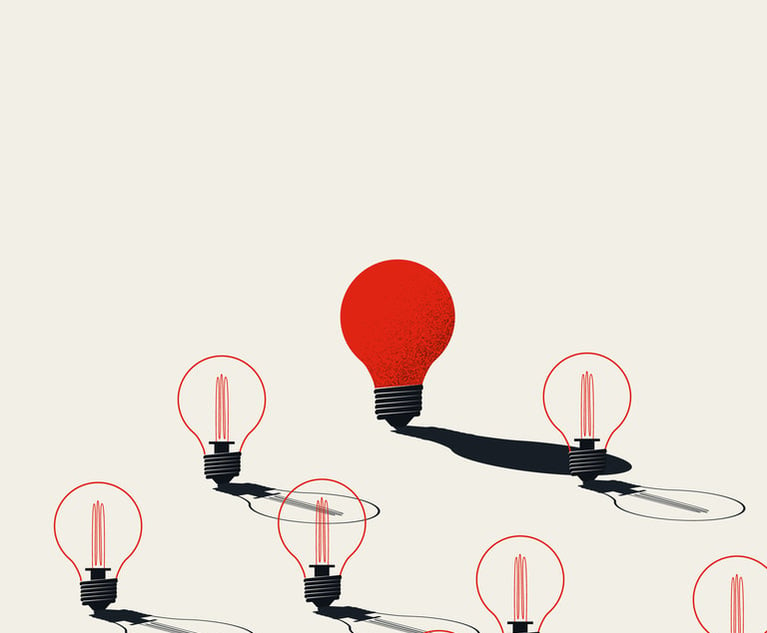 Michael P. Maslanka, assistant professor of law, UNT Dallas College of Law.
Michael P. Maslanka, assistant professor of law, UNT Dallas College of Law.The Five Powers Poetry Teaches Us
The virus can rob us of much but it can never rob us of certain powers we possess. Here then are powers that poetry teaches that everyone has and that can never be stripped away.
May 11, 2020 at 08:06 PM
7 minute read
I am trying yet again to organize my book collection while sheltered in place, and have turned up a forgotten nugget: "Good Poems for Hard Times," a collection of poems compiled by Garrison Keillor. He ends his introduction with these lines, "These poems describe a common life. It is good to know this. I hope you take courage from it." Agreed. The virus can rob us of much but it can never rob us of certain powers we possess. Here then are powers that poetry teaches that everyone has and that can never be stripped away. Ever.
|Power No. 1: The Power of Being There
We despair. We ask ourselves: How can I make things better? I am not a first responder or a nurse or a Dr. Anthony Fauci. But we can make things better even if it is just being there for another. This sentiment is profoundly expressed in Gregory Djanikian's "Children's Hospital, Emergency Room." He takes his injured daughter to an emergency room:
You do not want to be here
You wish it were you
The doctor is stitching up
It is a cut on the chin, fixable
This time it is deep enough.
The father zones out, thinking there is nothing he can do to be of help. An outlier, an irrelevancy. Until the poem concludes:
When your daughter calls out it hurts
And things regain their angularity
The vulnerable opaqueness, I'm here
You say, Be still. I'm here.
Being present is often not just enough, but more than enough.
|Power No. 2: The Power of Patience
Patience is not passivity, it is not waiting for events to roll you over. No, it is biding your time. Waiting for your shot, it is hoping for the best, preparing for the worst. Carl Sandburg taught us as much in "The Lawyer," a poem that resonates with many readers.
When the jury files in to deliver a verdict after weeks of direct and cross examinations,
hot clashes of lawyers and cool decisions of the judge,
Sandburg continues:
A lawyer for the defense clears his throat and holds himself ready if the word is "Guilty" to enter motion for a new trial, speaking in a soft voice, speaking in a voice slightly colored with bitter wrongs mingled with monumental patience, speaking with mythic Atlas shoulders of many preposterous, unjust circumstances.
Lawyers are special people—we abide circumstances. The word "abide" is sprinkled throughout the Bible—it means to wait patiently. And in abiding, there is power.
|Power No. 3: The Power of Acceptance
When I was trying cases I would sometimes in my opening statement tell the jury what the case was not about. Why? Because it is only human nature to hear a few statements and extrapolate a conclusion from them. Do let me state what I am not talking about here. I am not talking about servile acquiescence. I am not talking about mere acknowledgment. And I am certainly not talking about the pointless phrase, "it is what it is," which induces a thumb-sucking, infant-centric mindset.
Instead we must see reality as it is, not as we wish it to be. Only then can we overcome adversity. The late poet Galway Kinnell grasped this in his poem, "Prayer." It is an appropriately short poem:
Whatever happens. Whatever
what is is is what
I want. Only that. But that.
A prayer for clarity. A prayer to understand what reality is and not what we wish for reality to be. We can fix reality but we can't fix fantasy.
|Power No. 4: The Power of the Moment
In Hopi culture, there is no word for the future nor for the past. Same with various languages, such as Hindi and Punjabi. We cannot be paralyzed by the past nor intimidated by the future. We can only live and act and plan in this moment.
Several years ago, I was really sick. I have no recollection of seven days over the holidays. Afterward on a cold and sunny January day I ate a hot egg roll, the best food I have ever eaten or will eat. I think of that day when I read Charles Bukowski's poem, "too sweet." He tells us about a good day he had at the track, slipping the valet a solid tip, and easing into traffic in his German car. Flipping on the radio, he listens to the familiar announcer. Along the last race, muses they will each leave the world's rough and tumble. But not today:
meanwhile, there is a certain rhythm
to the essentials that now need
attending to…
I decide not to die just
yet:
this good life just smells too
sweet.
|Power No. 5: The Power of Connection
Humans crave connection. Without it, isolation and despondency take root; with it, solidarity and meaning take flight. Hard times compel us to seek out connection, Edward Hirsch writes of connection in his signature poem, "Memorandums" (it isn't in Keillor's anthology but fits in ideally):
I put down these memorandums of my affection
To stave off the absolute
To stave off the flat palm of the wind/ Pressed against the forehead
To stave off the thought of stars
Swallowed by the constellation of darkness.
Hirsch then catalogues his losses: mother, brother, grandparents who all loved him and helped him and died.
He pivots—as great poets always do—from the personal to the universal:
I put down these memorandums of my affection
… in honor of all those who have been
Conscripted into the brotherhood
of loss…
Isn't conscripted the exactly right word for our times?
Hirsch then delivers his transcendent message:
We will be lifted up and carried a far distance
On invisible wings
and then set down in an empty field
We will carry our hearts on our bodies
Over shadowy tunnels and bridges
Someday we will let them go again, like kites
A valuable worldview now more than ever.
So, valued reader, when this testing of us is over (and it will be but I know not when), and you spot me sipping a really cold vodka martini, or slicing up rare strip steak, or soaking up vitamin D on a rambling walk, come up and introduce yourself. And if I tell you to go fly a kite, I know you won't be offended.
Michael P. Maslanka is an assistant professor of law at UNT Dallas College of Law. His email is [email protected].
This content has been archived. It is available through our partners, LexisNexis® and Bloomberg Law.
To view this content, please continue to their sites.
Not a Lexis Subscriber?
Subscribe Now
Not a Bloomberg Law Subscriber?
Subscribe Now
NOT FOR REPRINT
© 2025 ALM Global, LLC, All Rights Reserved. Request academic re-use from www.copyright.com. All other uses, submit a request to [email protected]. For more information visit Asset & Logo Licensing.
You Might Like
View All
Topping Kirkland, Weil Won the Most Valuable Major Bankruptcy Retentions of 2024

Changes at the Top: How 'Different Leadership Skills' Are Prevailing in Big Law

Bottoming Out or Merging Up? Law Firms That Shuttered in 2024

Trending Stories
- 1People in the News—Jan. 2, 2025—Eastburn and Gray, Klehr Harrison
- 2Deal Watch: Latham, Paul Weiss, Debevoise Land on Year-End Big Deals. Plus, Mixed Messages for 2025 M&A
- 3Bathroom Recording Leads to Lawyer's Disbarment: Disciplinary Roundup
- 4Conn. Supreme Court: Workers' Comp Insurance Cancellations Must Be Unambiguous
- 5To Avoid Conflict, NYAG Hands Probe Into Inmate's Beating Death to Syracuse-Area DA
Who Got The Work
Michael G. Bongiorno, Andrew Scott Dulberg and Elizabeth E. Driscoll from Wilmer Cutler Pickering Hale and Dorr have stepped in to represent Symbotic Inc., an A.I.-enabled technology platform that focuses on increasing supply chain efficiency, and other defendants in a pending shareholder derivative lawsuit. The case, filed Oct. 2 in Massachusetts District Court by the Brown Law Firm on behalf of Stephen Austen, accuses certain officers and directors of misleading investors in regard to Symbotic's potential for margin growth by failing to disclose that the company was not equipped to timely deploy its systems or manage expenses through project delays. The case, assigned to U.S. District Judge Nathaniel M. Gorton, is 1:24-cv-12522, Austen v. Cohen et al.
Who Got The Work
Edmund Polubinski and Marie Killmond of Davis Polk & Wardwell have entered appearances for data platform software development company MongoDB and other defendants in a pending shareholder derivative lawsuit. The action, filed Oct. 7 in New York Southern District Court by the Brown Law Firm, accuses the company's directors and/or officers of falsely expressing confidence in the company’s restructuring of its sales incentive plan and downplaying the severity of decreases in its upfront commitments. The case is 1:24-cv-07594, Roy v. Ittycheria et al.
Who Got The Work
Amy O. Bruchs and Kurt F. Ellison of Michael Best & Friedrich have entered appearances for Epic Systems Corp. in a pending employment discrimination lawsuit. The suit was filed Sept. 7 in Wisconsin Western District Court by Levine Eisberner LLC and Siri & Glimstad on behalf of a project manager who claims that he was wrongfully terminated after applying for a religious exemption to the defendant's COVID-19 vaccine mandate. The case, assigned to U.S. Magistrate Judge Anita Marie Boor, is 3:24-cv-00630, Secker, Nathan v. Epic Systems Corporation.
Who Got The Work
David X. Sullivan, Thomas J. Finn and Gregory A. Hall from McCarter & English have entered appearances for Sunrun Installation Services in a pending civil rights lawsuit. The complaint was filed Sept. 4 in Connecticut District Court by attorney Robert M. Berke on behalf of former employee George Edward Steins, who was arrested and charged with employing an unregistered home improvement salesperson. The complaint alleges that had Sunrun informed the Connecticut Department of Consumer Protection that the plaintiff's employment had ended in 2017 and that he no longer held Sunrun's home improvement contractor license, he would not have been hit with charges, which were dismissed in May 2024. The case, assigned to U.S. District Judge Jeffrey A. Meyer, is 3:24-cv-01423, Steins v. Sunrun, Inc. et al.
Who Got The Work
Greenberg Traurig shareholder Joshua L. Raskin has entered an appearance for boohoo.com UK Ltd. in a pending patent infringement lawsuit. The suit, filed Sept. 3 in Texas Eastern District Court by Rozier Hardt McDonough on behalf of Alto Dynamics, asserts five patents related to an online shopping platform. The case, assigned to U.S. District Judge Rodney Gilstrap, is 2:24-cv-00719, Alto Dynamics, LLC v. boohoo.com UK Limited.
Featured Firms
Law Offices of Gary Martin Hays & Associates, P.C.
(470) 294-1674
Law Offices of Mark E. Salomone
(857) 444-6468
Smith & Hassler
(713) 739-1250






